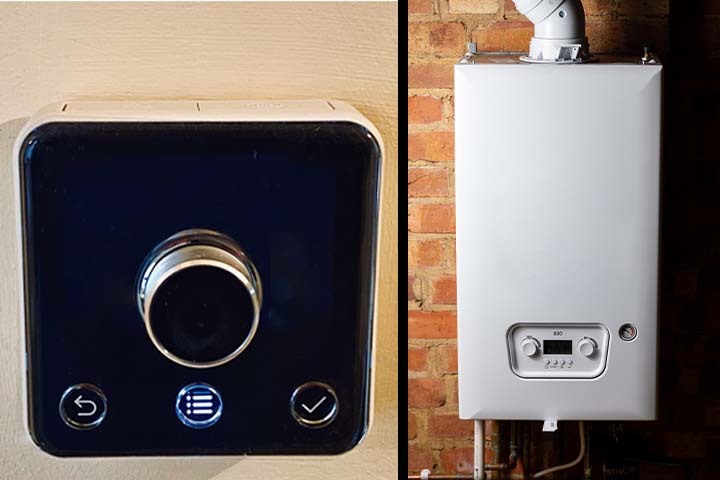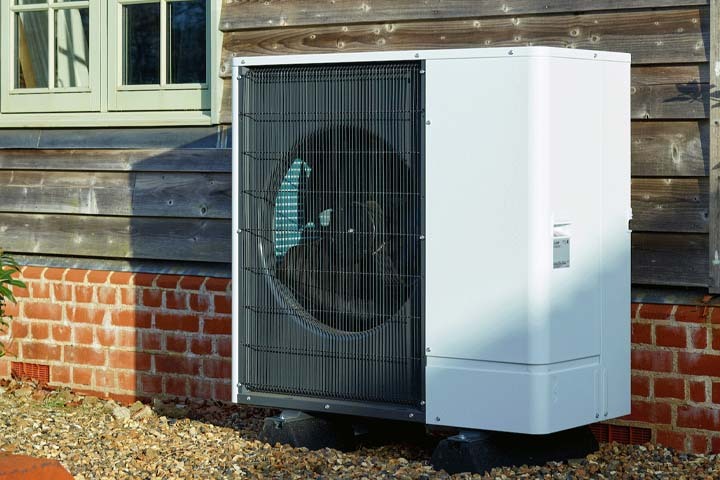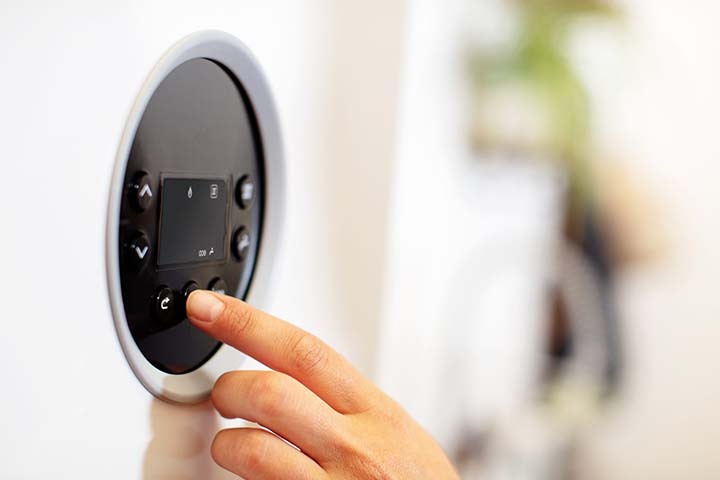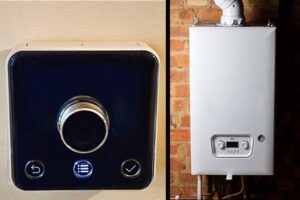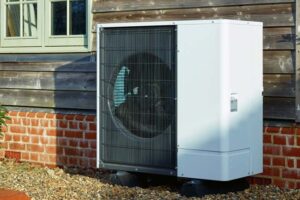Table of Contents
The heat exchanger is mostly found within your boiler. It’s the crucial component that produces hot water and heating for your property. If your heat exchanger is faulty, you’ll soon be without hot water or heating.
Therefore, taking good care of a heat exchanger is essential to ensure your boiler runs at peak efficiency, saving you money on costly repairs. Unfortunately, only a few homeowners know what a boiler heat exchanger is or how to maintain it.
In this blog, we’ll explain how to understand and maintain boiler heat exchangers and spot issues you must act on to keep your boiler functioning at its best.
What Is a Heat Exchanger?
A heat exchanger does precisely what it says on the tin. They move heat from one fluid or material to another, usually water or gas, without mixing the two.
Heat exchangers are found in all sorts of appliances and industries. They can be found in power plants to recycle heat in waste gases. On the other hand, the boiler heat exchanger may transfer heat away from a room and keep parts cool. You can see this in freezers and air conditioners.
How Do Heat Exchangers Work?
Heat swaps work by moving heat from one place to another. When your boiler is turned on and natural gases are burned, the by-products, called flue gases, enter and move through the heat exchanger. There is a long, coiled pipe within the heat exchanger. The hot flue gases heat the spiral pipe, gradually heating the cold water surrounding it.
A heat exchanger must be used to prevent the mixing of two substances, as this would prevent your boiler from working efficiently.
Types of Boiler Heat Exchangers
Without a heat exchanger, your boiler wouldn’t be able to heat the water distributed to your radiators and comes out of your taps, so a heat exchanger is an integral part of your boiler. You would have no hot water to heat without a heat exchanger,
Stainless Steel Heat Exchangers
Your heat exchanger must be made of solid materials to be long-lasting. Because stainless steel lasts a long time, it can be used for this purpose.
The benefit of using a stainless-steel heat exchanger in a boiler is less chance of corrosion. This will make your heat exchanger last longer and keep working well, saving you money in the long run.
Stainless steel heat exchangers can also withstand a higher flow rate, allowing water to be heated quickly. This increased flow rate also lowers the risk of blockages within the exchanger from debris or rust, which can also extend its lifespan.
Additionally, stainless steel is a very lightweight material that cleans itself, making it perfect for many products that heat water.
Aluminium Heat Exchanger
Aluminium heat exchangers are more tolerant to variable system quality (e.g., flow rate settings, air, and dirt) than stainless steel designs, allowing for more extensive waterways.
This means they are well suited for a boiler replacement on an old system.
An aluminium heat exchanger allows for a broader range of temperature differentials, typically 11–20 °C. This makes it perfect for older systems that cannot reach a 20 °C differential without system modifications.
Condensing vs Non-Condensing Boilers
There are two types of boiler units, each functioning slightly differently due to the number of heat exchangers it includes.
Non-Condensing Boilers
Non-condensing boilers leave behind much more carbon than condensing boilers because they only have one heat exchanger. When non-condensing boilers burn gas to make heat, the leftover gases go out the flue instead of being recycled.
Condensing Boilers
Condensing boilers have a more efficient heat exchanger structure. They still use the same basic principle of the coiled pipe but can extract much more energy from the flue gasses passing over them. Put simply, they have a longer coil of pipe, which means more power can be transferred to the water passing through it. This means that the flue doesn’t lose very little energy.
The UK Government now requires all newly fitted boilers to be condensing units, though exemptions may be granted.
Faulty Boiler Heat Exchanger Symptoms
Whether the material is aluminium, stainless steel, or otherwise, we recommend that your heat exchanger be checked every 12 months by a gas-safe engineer to identify issues before they become urgent. Knowing your heat exchanger’s health can be challenging without a professional review, though some are clear.
Noises Coming From the Boiler
If you have noticed strange noises from your boiler, this may indicate a faulty heat exchanger. High-pitched buzzing sounds, also called “kettling,” should be heard. This happens when limescale builds up, and it’s a clear sign that you need to clean your exchanger. Tapping sounds could mean that your central heating system has sludge, which lets rust and other garbage get stuck in the system.
Leakages
Noise from the boiler can signal debris build-up in the heat exchanger. Being serviced could prevent your heat exchanger from leaking. If your boiler is quite old and water is constantly dripping from the bottom of its casing, it could be a sign that the heat exchanger is faulty, meaning a replacement may be required. Identifying a cracked or leaking heat exchanger on modern boilers is sometimes more challenging. This is best to hire a qualified professional to identify any issue.
Dirty Radiator Water
Dirty radiator water can block your boiler and cause severe damage. You’ll be able to see this by bleeding your radiators, where the water will appear black or discoloured. This is caused by central heating sludge, a collection of rust, debris, and residue from copper pipes and radiators.
How to Clean Your Heat Exchanger
Keeping the exchanger clean and in good shape will help your boiler last longer. There is always a risk of dirt or debris from your radiators that will get into your boiler or heat exchanger.
You’ll need to call a Gas Safe-registered expert to have the device cleaned. Never remove a boiler heat exchanger yourself, as it is unsafe and could cause unnecessary, costly damage to your boiler.
Limescale
While we strongly recommend not removing or cleaning the device yourself, you can take steps to reduce the risk of limescale buildup. Talk to your heating engineer about installing a limescale reducer as a filter or using a limescale silencer to remove build-up if the problem is more advanced.
Central Heating Sludge
Rust and other debris get into the water because of central heating sludge. It is suggested that you clean your heating system every five years to prevent the boiler heat exchanger from getting clogged and damaged. You can also put in a filter to help catch trash as it passes through it.
Summary
In summary, boiler heat exchanger work to transfer heat, making them a crucial component of any boiler. The most important component of your boiler that makes hot water and heat is the boiler heat exchanger. Strange noises, leaks, and dirty radiator water are all signs of a broken exchanger. Ensure your heat exchanger in boiler gets yearly repair checks from a gas-safe engineer to make your boiler last longer.




